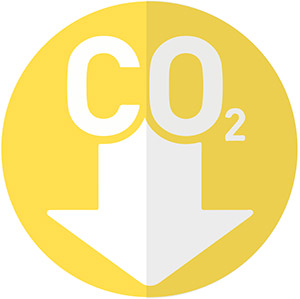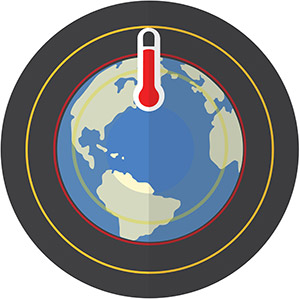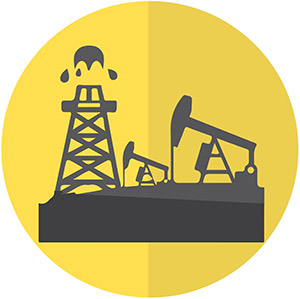UCO collection and Carbon Footprint
ECO OIL and Restaurants Take a Hand in Reducing Greenhouse Gas Emission
| Facing the facts of global warming and the Oil Peak crisis, ECO OIL and co-operative restaurants greatly support deduction in emission of Carbon and greenhouse gas through recycling of used cooking oil (“UCO”) into Biodiesel, which is a green energy. We are eager to participate in the reduction of emission and encourage restaurants to provide us all UCO. We export UCO to transform it into renewable energy - biodiesel, which enhance the recycling and utilization of waste and make a smaller Carbon footprint. |
 |
What Climate Change and Global Warming are?
| Climate change refers to the change in climate as a result of human activities that cause a change in the atmosphere’s composition, in addition to natural climate variability. Human activities cause an increase in ambient concentration of greenhouse gases, mainly through burning of fossil fuels. The greenhouse gases act like a blanket in the atmosphere, trapping heat on Earth and keeping our planet warm. However, the human-induced increase in greenhouse gases has enhanced the greenhouse effect and caused the climate system to warm – a phenomenon commonly called global warming. |
 |
The Impact of Global Warming
| Continued global warming could bring a series of damaging effects. Global warming could mean polar ice melting to raise the sea level. Global warming also damages the ecosystems of plants and animals. As a result of habitat loss, animals may be forced to migrate to other habitats. It is assessed that about 20 to 30% of plant and animal species are exposed at increased risk of extinction if global average temperature increases more than 1.5°C. It could change the normal weather patterns and cause drought, flooding and other extreme weather conditions. This general rise in temperature in turn leads to a proliferation of other problems, such as more frequent heat waves, rise of sea level, reduction in agricultural production, scarcity of water resource, spread of disease, ecological and environmental imbalance, etc. Extreme weather events, droughts, warmer temperatures, polar ice melting and sea level rising affect directly the whole ECO system which human survival depend on. |
 |
What is Peak Oil?
| Peak Oil refers to the fact that after a certain point in time, the global level of oil production will go into decline. The concept of Peak Oil is agreed, there is only difference over the timing of when it will happen. Peak oil does not mean we will 'run out of oil from one day to the next' - it means that we will have ever declining amounts available at ever higher prices with increasing instability of supply. |
 |
Positive Impact of Biodiesel to the Climate
| Biodiesel is a form of renewable energy. The carbon dioxide emitted during its combustion will be absorbed via photosynthesis by plants. The wider use of biodiesel in lieu of fossil diesel, which is non-renewable, is therefore conducive to reducing greenhouse gas emissions and arresting global climate changes due to the rising greenhouse gas level. The benefit of a plant-based fuel is that it comes from a renewable resource, unlike fossil fuels such as coal, gasoline and natural gas, which are formed from decomposed organisms buried in the ground for millions of years. The production of fossil fuel also involves many high-consumption processes that biofuel does not—digging of oil wells, pumping the oil, refining it, transporting it over land and sea. Biofuel is much cleaner too, as it releases less carbon dioxide and benzene into the air than fossil alternatives. |
 |
ECO OIL and Restaurants Take a Hand in Reducing Greenhouse Gas Emission
| Facing the facts of global warming and the Oil Peak crisis, ECO OIL and co-operative restaurants greatly support deduction in emission of Carbon and greenhouse gas through recycling of used cooking oil (“UCO”) into Biodiesel, which is a green energy. We are eager to participate in the reduction of emission and encourage restaurants to provide us all UCO. We export UCO to transform it into renewable energy - biodiesel, which enhance the recycling and utilization of waste and make a smaller Carbon footprint. |
 |
What Climate Change and Global Warming are?
| Climate change refers to the change in climate as a result of human activities that cause a change in the atmosphere’s composition, in addition to natural climate variability. Human activities cause an increase in ambient concentration of greenhouse gases, mainly through burning of fossil fuels. The greenhouse gases act like a blanket in the atmosphere, trapping heat on Earth and keeping our planet warm. However, the human-induced increase in greenhouse gases has enhanced the greenhouse effect and caused the climate system to warm – a phenomenon commonly called global warming. |
 |
The Impact of Global Warming
| Continued global warming could bring a series of damaging effects. Global warming could mean polar ice melting to raise the sea level. Global warming also damages the ecosystems of plants and animals. As a result of habitat loss, animals may be forced to migrate to other habitats. It is assessed that about 20 to 30% of plant and animal species are exposed at increased risk of extinction if global average temperature increases more than 1.5°C. It could change the normal weather patterns and cause drought, flooding and other extreme weather conditions. This general rise in temperature in turn leads to a proliferation of other problems, such as more frequent heat waves, rise of sea level, reduction in agricultural production, scarcity of water resource, spread of disease, ecological and environmental imbalance, etc. Extreme weather events, droughts, warmer temperatures, polar ice melting and sea level rising affect directly the whole ECO system which human survival depend on. |
 |
What is Peak Oil?
| Peak Oil refers to the fact that after a certain point in time, the global level of oil production will go into decline. The concept of Peak Oil is agreed, there is only difference over the timing of when it will happen. Peak oil does not mean we will 'run out of oil from one day to the next' - it means that we will have ever declining amounts available at ever higher prices with increasing instability of supply. |
 |
Positive Impact of Biodiesel to the Climate
| Biodiesel is a form of renewable energy. The carbon dioxide emitted during its combustion will be absorbed via photosynthesis by plants. The wider use of biodiesel in lieu of fossil diesel, which is non-renewable, is therefore conducive to reducing greenhouse gas emissions and arresting global climate changes due to the rising greenhouse gas level. The benefit of a plant-based fuel is that it comes from a renewable resource, unlike fossil fuels such as coal, gasoline and natural gas, which are formed from decomposed organisms buried in the ground for millions of years. The production of fossil fuel also involves many high-consumption processes that biofuel does not—digging of oil wells, pumping the oil, refining it, transporting it over land and sea. Biofuel is much cleaner too, as it releases less carbon dioxide and benzene into the air than fossil alternatives. |
 |




